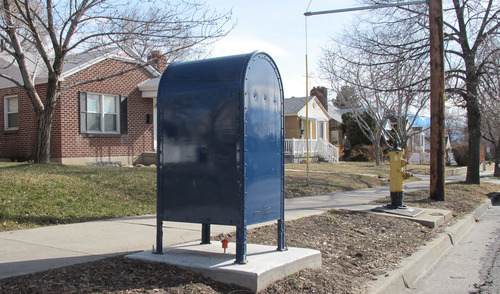This is an archived article that was published on sltrib.com in 2011, and information in the article may be outdated. It is provided only for personal research purposes and may not be reprinted.
In the 2010 movie "Letters to God," an alcoholic postal carrier seeks redemption from his troubles and gets support from the boss to stay on the job.
In Utah, fiction isn't far from fact for the financially troubled U.S. Postal Service — except that taxpayers are also helping foot the bill for that redemption.
It starts with the construction of $1,000 concrete slabs, one of which sits next to a light pole in the front yard of a Sugar House home.
The 3-by-3-foot pad serves as the base for a green or blue metal mailbox. A carrier who loses his driver's license because of a DUI picks up mail from the box and walks his route instead of driving it.
Citing privacy reasons, the federal agency wouldn't disclose how many times it constructs these extra slabs at the public's expense, or the extent of the problem of carriers with DUI convictions in Utah.
That has piqued the curiosity of U.S. Rep. Jason Chaffetz, R-Utah. A ranking member on the House Subcommittee on Federal Workforce, Postal Service and the District of Columbia, Chaffetz was surprised to hear of the type of assistance carriers can get when they lose their licenses — and the cost to help them.
"You want to help people who are having trouble, but, come on, that's an awful lot of stamps," said Chaffetz, who represents Utah's 3rd District.
A Salt Lake Tribune data search indicated that perhaps as many as 120 Utah postal employees on the payroll in 2009 had DUI convictions in their histories, including a northern Utah postmaster.
Robert Vunder, a Postal Service spokesman based in Salt Lake City, confirmed that at least twice in the past three years, state mail carriers with alcohol issues were given special accommodations to be able to stay on the job.
They include the Sugar House drop-box location, and, in another case, a carrier on an unidentified rural Utah route was allowed to carry a portable Breathalyzer for spot testing, Vunder said.
"Such cases as these are extremely rare," wrote Brian Sperry, a Denver-based Postal Service spokesman in an emailed response to questions. "We review each situation on a case-by-case basis and, when appropriate, make every reasonable effort to try and find them work that doesn't require driving."
Sperry said it is common for green or blue "relay" mailboxes to be moved around to established spots, keeping extra boxes in the inventory to help distribute the mail on routes where carriers don't normally drive.
But some carriers on the Sugar House route privately say the problem occurs more than management has characterized in its responses. Those same carriers, whom The Tribune isn't identifying, fear retribution.
"They should be fired," said one, upset with how carriers with drinking problems are handled by management.
The Postal Service has 2,000 city and rural carriers in Utah. The Tribune data search included the cross-checking of a 2009 list of postal employee records in Utah with court documents going back to 1997.
The search resulted in 120 Postal Service employees listed with DUI convictions, 35 of them listed as Utah carriers. The data search, using an employee list with names for just one year, was limited to Utah district courts and most justice courts.
Exactly how many Postal Service employees lost their driving privileges in Utah hasn't been determined. Some of the carriers may not have been federal employees at the time of the DUI. The Postal Service again said personnel privacy rules wouldn't allow them to confirm the record check in any manner.
A spokesman for one of the two carriers unions, the National Association of Letter Carriers, said it had an understanding that it was "unlikely" an individual would be able to continue to deliver mail until driving privileges were restored.
But the union also pointed out that its contract encouraged the Postal Service to help employees get treatment for alcohol issues and that reasonable efforts are made to reassign such employees to nondriving duties.
Residents have mixed reactions about how the Postal Service handled carriers' dilemmas.
Kandy Richards, a Sugar House resident, appreciates how the Postal Service might have considered the cost to rehire and retrain new employees to replace those who have been fired or moved off a route.
"Each case needs to viewed individually," Richards said. "The cost of replacing that carrier could easily have outweighed a few new drop boxes."
Richards knew about accommodations the Postal Service made for one of her carriers, now retired, and said the carrier had a good delivery record among her neighbors.
The federal agency lost $8.5 billion last year, so saving or spending dollars there is under congressional scrutiny. Some postal locations may be shuttered to save money.
Last month, President Barack Obama asked Congress for an $11 billion bailout for the agency, which claims to have been mostly operating without taxpayer dollars and on generated revenue.
Chaffetz, also a member of the House Committee on Oversight and Government Reform, said he has already begun asking questions about the Postal Service policy of accommodating carriers without a driver's license. Chaffetz requested a congressional investigation on what it costs, no matter how small or large it may be to the agency budget.
The unofficial motto often attributed to the Postal Service — but also used in its advertising — is about a carrier letting "neither snow, nor rain, nor heat, nor gloom of night" get in the way of the delivering the mail.
Nor DUI, some might add to that creed.



